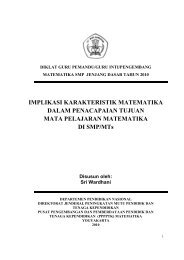25 Biggest Mistakes Teachers Make and How to Avoid Them
25 Biggest Mistakes Teachers Make and How to Avoid Them
25 Biggest Mistakes Teachers Make and How to Avoid Them
You also want an ePaper? Increase the reach of your titles
YUMPU automatically turns print PDFs into web optimized ePapers that Google loves.
38 Discipline<br />
SCENARIO 4.5<br />
Old School—1899 or New School—1999?<br />
My family moved so I had <strong>to</strong> start second grade as a new student. I was scared. I didn’t<br />
know anyone at my new school. Everything was fine until PE class that first day of<br />
school. In PE, the coach asked the class <strong>to</strong> line up <strong>and</strong> the lines were supposed <strong>to</strong> start<br />
on designated little circles. Needless <strong>to</strong> say, I wasn’t accus<strong>to</strong>med <strong>to</strong> their style of lining<br />
up, so I formed my own individual line that wasn’t on a circle. Unfortunately, the coach<br />
noticed I was out of line, so he yelled at me <strong>and</strong> rudely asked me <strong>to</strong> follow his directions,<br />
not knowing that this was my first day of class. My self-esteem dropped at that moment.<br />
He didn’t realize that I was trying <strong>to</strong> meet his request but misinterpreted his directions.<br />
Outdated, antiquated, passé,<br />
or archaic, by any name the<br />
practice of having students line up<br />
on specific circles <strong>and</strong> follow specific<br />
directions is a relic of a bygone era.<br />
Turn-of-the-century teaching (1890s–<br />
1930s) featured a similar technique<br />
where students had <strong>to</strong> literally <strong>to</strong>e<br />
the line <strong>and</strong> recite their lessons.<br />
During this period, teachers <strong>to</strong>ld students<br />
how <strong>and</strong> where <strong>to</strong> sit or st<strong>and</strong>,<br />
if <strong>and</strong> when <strong>to</strong> talk, <strong>and</strong> so on.<br />
Students often waited for the teacher<br />
<strong>to</strong> give the signal <strong>to</strong> start <strong>and</strong> the student<br />
“body” was expected <strong>to</strong> move<br />
in lock-step fashion as one (Cuban,<br />
1984). The coach publicly ridiculed<br />
the unsuspecting student who was<br />
unaware of the practice. Perhaps the<br />
coach would have been a little more<br />
lenient if he had been aware that<br />
SCENARIO 4.6<br />
If You Muse, You Lose<br />
the student was new, but given his<br />
strong need for control <strong>and</strong> his tendency<br />
<strong>to</strong>ward loud reprim<strong>and</strong>, I<br />
doubt it.<br />
“There is an objection <strong>to</strong> reproving<br />
the pupil publicly....Ridicule is<br />
another weapon that should never be<br />
used....It is the modest, conscientious<br />
child that is most affected,”<br />
(McFee, 1918). These quotes are evidence<br />
that perceptive, sensible teachers<br />
were around at the turn of the<br />
century. This old-fashioned advice is<br />
timeless <strong>and</strong> timely. Effective teachers<br />
are aware of the effects of public<br />
ridicule <strong>and</strong> shaming on a student’s<br />
self-esteem <strong>and</strong> usually avoid it in<br />
favor of soft, private reprim<strong>and</strong>s. In<br />
addition, they would have rules or<br />
practices posted or they would offer a<br />
new student orientation.<br />
In fourth grade, I was not paying close attention when the teacher was reading a s<strong>to</strong>ry<br />
<strong>to</strong> the class. At the end of the s<strong>to</strong>ry, another boy <strong>and</strong> I were asked <strong>to</strong> come <strong>to</strong> the front<br />
of the room <strong>and</strong> repeat as much of the s<strong>to</strong>ry as possible. I had <strong>to</strong> go first <strong>and</strong> needless<br />
<strong>to</strong> say, did not recall much of the s<strong>to</strong>ry. The boy did very well. I remember how embarrassed<br />
I was.





